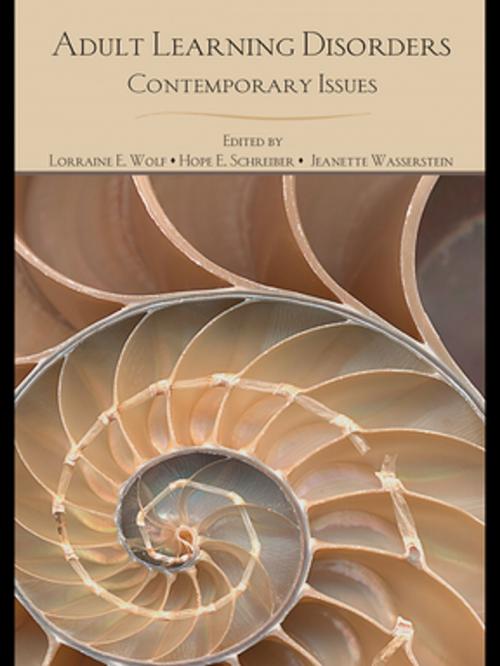Adult Learning Disorders
Contemporary Issues
Nonfiction, Health & Well Being, Psychology, Neuropsychology| Author: | ISBN: | 9781136874796 | |
| Publisher: | Taylor and Francis | Publication: | October 18, 2010 |
| Imprint: | Psychology Press | Language: | English |
| Author: | |
| ISBN: | 9781136874796 |
| Publisher: | Taylor and Francis |
| Publication: | October 18, 2010 |
| Imprint: | Psychology Press |
| Language: | English |
Recent advances in neuroimaging and genetics technologies have enhanced our understanding of neurodevelopmental disorders in adults. The authors in this volume not only discuss such advances as they apply to adults with learning disorders, but also address their translation into clinical practice.
One cluster of chapters addresses developmental concerns as children and adolescents with learning disorders approach young adulthood. Experts discuss dyslexia, language-based and writing disorders, perhaps the most widely studied group of learning disorders, from the point of view of neuroimaging and genetic underpinnings. Chapters on the neuroscience of nonverbal, math and executive function disorders are also included.
Clinically-oriented chapters with case studies, recommendations for accommodation, and considerations for evaluation follow. Study of specialized populations - such as late high school students, college, medical and law students - further demonstrate how our expanded knowledge base may be applicable to clinical practice. The heterogeneity of adults with learning disorders, the complexity of their clinical presentation and co-existing disorders are addressed from both a scientific and clinical point of view demonstrating how empirical research and clinical practice inform each other.
This volume will enhance the practice of clinicians and educators working with adults with neurodevelopmental disorders, as well as providing essential current information for researchers of adults with learning disorders.
Recent advances in neuroimaging and genetics technologies have enhanced our understanding of neurodevelopmental disorders in adults. The authors in this volume not only discuss such advances as they apply to adults with learning disorders, but also address their translation into clinical practice.
One cluster of chapters addresses developmental concerns as children and adolescents with learning disorders approach young adulthood. Experts discuss dyslexia, language-based and writing disorders, perhaps the most widely studied group of learning disorders, from the point of view of neuroimaging and genetic underpinnings. Chapters on the neuroscience of nonverbal, math and executive function disorders are also included.
Clinically-oriented chapters with case studies, recommendations for accommodation, and considerations for evaluation follow. Study of specialized populations - such as late high school students, college, medical and law students - further demonstrate how our expanded knowledge base may be applicable to clinical practice. The heterogeneity of adults with learning disorders, the complexity of their clinical presentation and co-existing disorders are addressed from both a scientific and clinical point of view demonstrating how empirical research and clinical practice inform each other.
This volume will enhance the practice of clinicians and educators working with adults with neurodevelopmental disorders, as well as providing essential current information for researchers of adults with learning disorders.















